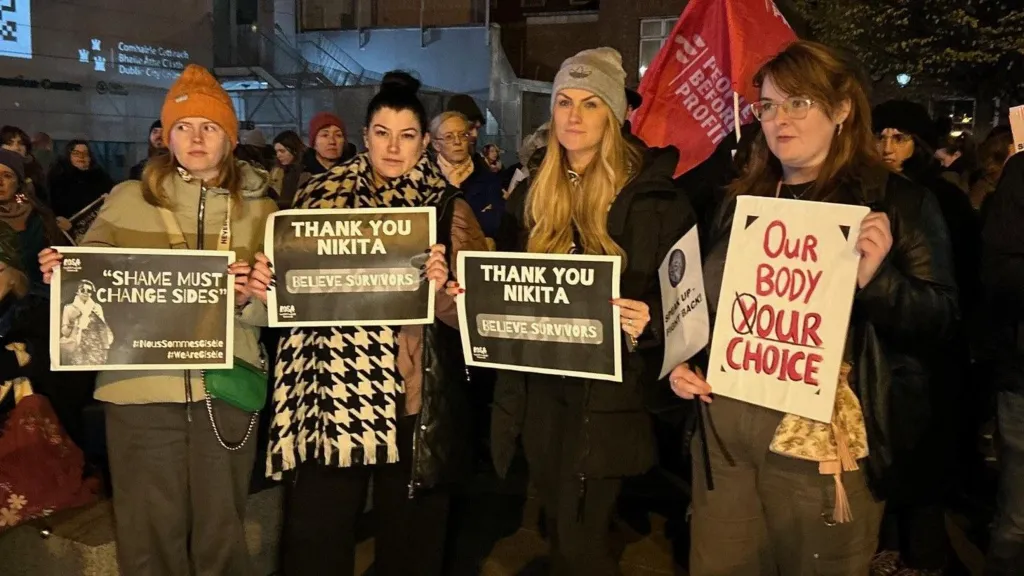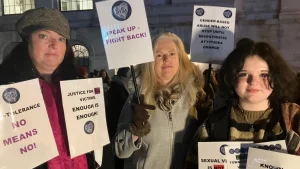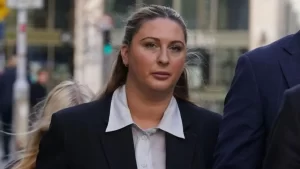Marchers show Nikita Hand support after McGregor case
3 min read
Women take part in a solidarity demonstration in Dublin (Cillian Sherlock/PA)
Several hundred people gathered in Dublin to show their support for Nikita Hand, the woman who won a civil rape case against the renowned mixed martial artist Conor McGregor. The case concluded on Friday when a jury at the High Court in Dublin found McGregor guilty of assaulting Hand by raping her in a hotel in December 2018. As a result, McGregor was ordered to pay Hand nearly €250,000 (£206,000) in damages.
The protest, organized by ROSA, a socialist feminist movement, took place on International Day for the Elimination of Violence Against Women. The march began at Dublin City Hall, proceeding along the River Liffey, and ended at the office of the Irish Director of Public Prosecutions (DPP). Protesters expressed frustration over the DPP’s decision not to pursue criminal charges against McGregor, despite the civil court ruling in favor of Hand.
Among the speakers at the protest was Natasha O’Brien, a high-profile victim of an assault by an Irish soldier. O’Brien shared her admiration for Hand, stating she was “in awe” of her courage. O’Brien emphasized that Hand’s victory demonstrated to other victims that they still have a voice and the possibility of justice.

The demonstration underscored broader concerns about how sexual assault cases are handled in Ireland, particularly the legal thresholds required for criminal charges. In a civil case like Hand’s, the standard of proof is based on the “balance of probabilities,” which is a lower threshold than in criminal cases where the burden of proof is “beyond reasonable doubt.” This difference in legal standards means that even when civil cases result in favorable outcomes for victims, criminal charges may not follow.
Protesters were also vocal about the failure to prosecute McGregor criminally, despite the High Court ruling in Hand’s favor. Donna McCarthy, who traveled from County Kerry to attend the protest, described the DPP’s decision as “absolutely disgraceful.” McCarthy stressed the importance of fighting for women and girls who have not had their voices heard, noting that some victims may not even have the chance to bring their cases to court.
Deirdre De Feu, another protester, explained that women across the country do not feel safe, whether in public, at home, or on the streets. She said the protest was a way to come together and show solidarity with all women in need of support. Donna Heaney, a member of the survivors’ group Sisi, echoed similar sentiments, emphasizing that victims must be heard and believed. Heaney pointed out the significance of the DPP’s decision not to prosecute McGregor, calling it a huge blow for victims of sexual violence. She expressed relief that there was some form of justice in the civil case, though she noted that it was not enough, as many other victims continue to suffer in silence.

The DPP had informed Hand in 2020 that there was “insufficient evidence” to bring a criminal case against McGregor and that there was not a reasonable prospect of conviction. Hand requested a review of the decision, feeling that she was treated unfairly due to McGregor’s celebrity status. Her appeal, however, did not result in a change in the DPP’s position.
In response to the public outcry, outgoing Irish Justice Minister Helen McEntee defended the independence of the legal system. At the weekend, McEntee remarked, “We have a very independent system in this country, and I think that’s right. I really think it’s important that we respect that independence.”
Despite the legal setbacks, the support for Nikita Hand at the protest highlighted a growing demand for greater accountability in handling sexual assault cases in Ireland. The protestors’ voices underscored the importance of ensuring that victims are given the platform and resources they need to seek justice, and they vowed to continue advocating for change in the system.





